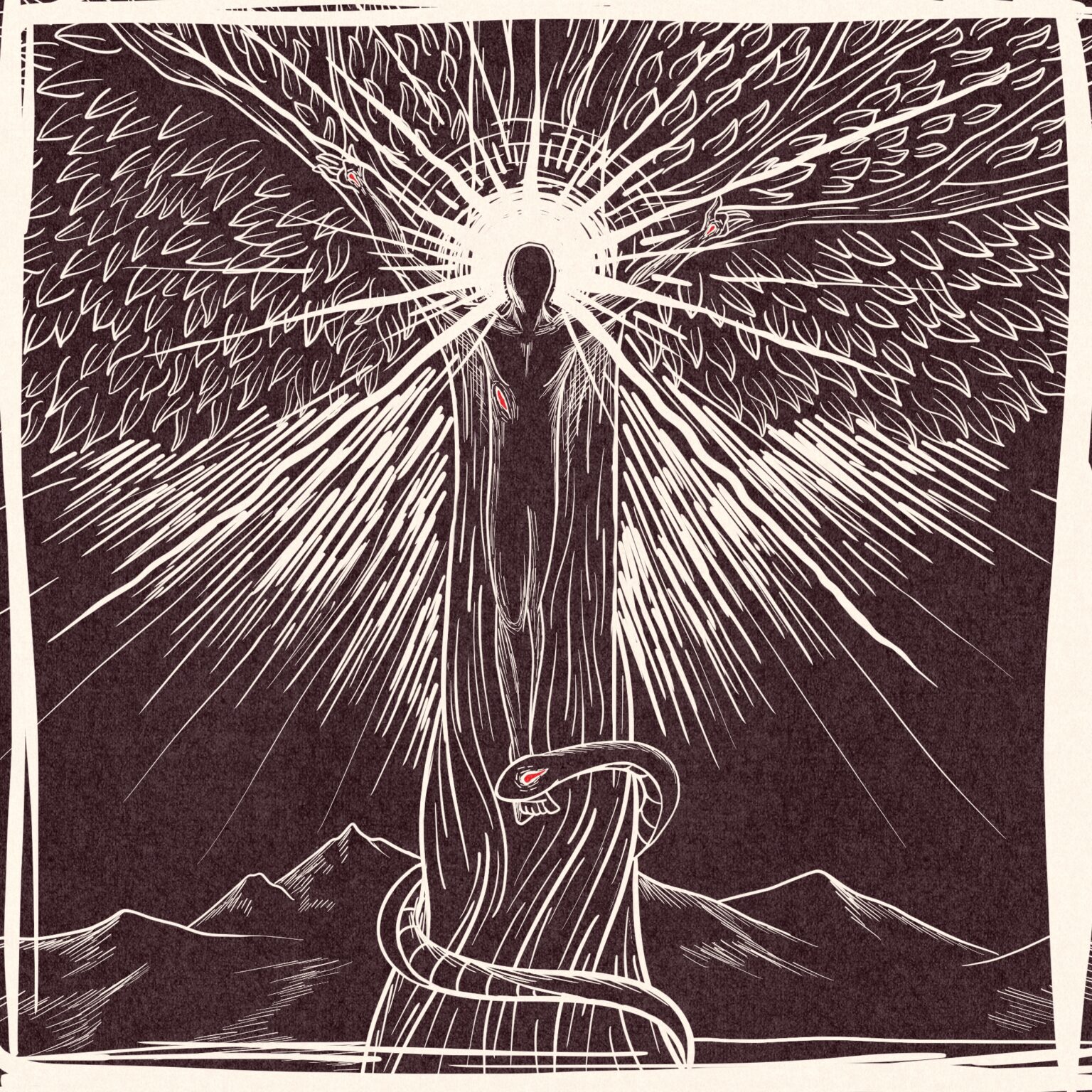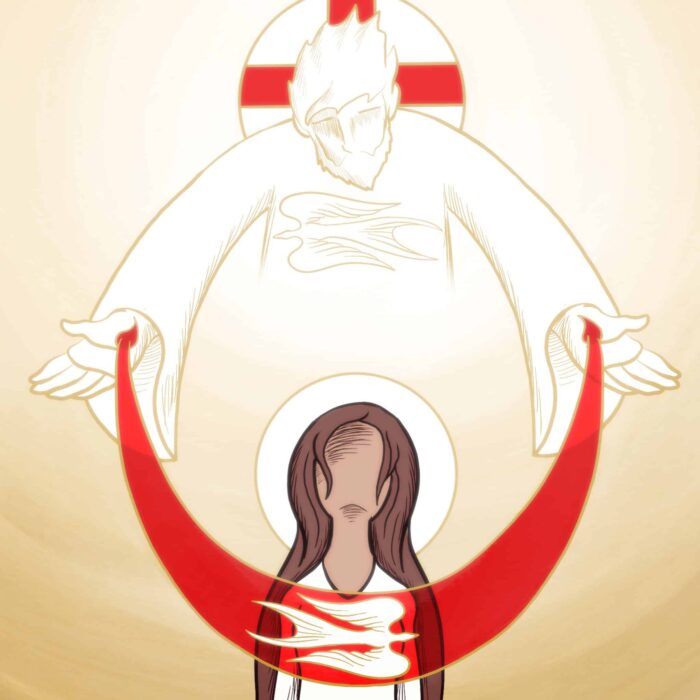1 Corinthians 8:1-3, “This knowledge puffs up, but love builds up. If anyone imagines that he knows something, he does not yet know as he ought to know. But if anyone loves God, he is known by God.”
(I’ve given you three levels of complexity on this right up, so, read which ever version your time allows 🙂 Also, as a special gift for patrons, I’ve included an alternate version of the picture for you. I was experimenting with a wood block cut look, and so had two different versions. Let me know which you like better if you get a chance.)
The Tree of Love on Calvary IS the true Tree of Knowledge…it is here that Adam’s fallen race learns HOW to know all things and WHO they know in all things.
_______________
Longer Thoughts:
True knowledge of God is love for God, but this love cannot exist apart from receiving God’s love for us in the revelatory redemption of Calvary (1 John 4:10,19). Thus, we cannot know God unless we know ourselves to be known and loved by God in Christ crucified and raised.
And if the Triune God is the source and goal of all that exists, then the WAY we know God defines the WAY we know all things. So, if to truly know God is to love God, then to truly know anything is to love that thing. Love is knowledge and until we love something—ultimately as a communication of God in Christ (Colossians 1:20, Ephesians 1:10, Habakkuk 2:14)—we do not yet know it “as we ought to know”.
The Tree of Love on Calvary IS the true Tree of Knowledge…it is here that Adam’s fallen race learns HOW to know all things and WHO they know in all things.
[NOTE: when I say we do not know a thing unless we love it, I am speaking eschatologically, there are many thing we must abominate in the here and now (Psalm 97:10, Romans 12:9) while loving the part God will cause them to play in the symphony of His beauty]
_________________
Longest Thoughts:
Notice that Paul says that the one who imagines that he knows something does not yet know “as he ought to know.” So, Paul is not saying we should not have knowledge, he’s just saying that we should know “as we ought to know.” In other words, Paul says there are two ways of knowing…There is a way of knowing that puffs up ourself and there is a way of knowing that builds up others.
The example that Paul gives here for the way we “ought to know” is to love God. If we think we know something (about God, it would seem), we do not yet know as we ought to know, but if we love God, we are known by God. It seems that this love of God is an example of the way of knowing that Paul is commending; the right way to know.
So, in this example, the “way of knowing” refers to how we come to know something, namely, God. We do not come to know God by a grasping, mastering, “a priori” knowledge….such knowledge may attain facts or doctrinal clarity, but it is not knowing as it is necessary to know. Rather, we come to know God in truth only as we love Him. Only as we cherish, treasure, value, rejoice in, revel in, are enamored with God do we know Him as we ought…..and it is then that we find that it is not that we know God, but that He knows us. He is the actor, we are acted upon; He is the Subject, we are the object; He is the Knower, we are the Known…
And if God is truly known only by being loved, must this not be true of all things in the universe that He has created? If everything is from God in Christ and eschatologically communicative of God in Christ (Hab.2:14, Rom.11:36, Col.1:15ff), ought we not be able to love everything and everyone as expressions of His beauty? Is it not only possible, but necessary that we love all things since Love Himself is the source and root and telos of all things? And, further, must we not say that—therefore—until we have loved a thing or a person as an expression of God in Christ we do not yet know it as we ought to know it?
But what of the wicked things? What of the monstrous things? Some things we must abominate in the here and now (Psalm 97:10, Romans 12:9) while loving them eschatologically….abhorring what they are, while loving what God will cause them to become in the symphony of God’s beauty (Colossians 1:20, Ephesians 1:10)….
So…first off, it would seem that they way to know anything is through love, and this is because the way to know God (who is the epistemological and ontological ground of reality) is to love the Father in the Son by the Spirit.
But, recall, we love because He first loved us (1 John 4:19), which means we cannot truly know anything (since to truly know we must love) apart from first receiving the love of God in Christ (since apart from this reception of love we cannot truly love).
Love begets love, and love is the only way to truly know God, and therefore, to truly know anything. Thus, apart from knowing ourselves to be loved in the crucified and risen Christ, we cannot truly begin to know anything because we cannot truly love God until we first receive His love for us. And, apart from loving God, we cannot truly love (aka, rightly know) anything since the loveability of all things is ultimately grounded in God who we must love if we are to love anything aright.
The cross, then, is the beginning of all Knowledge; the true Tree of Knowledge. Not only because all that is to be known is bound up in the cross (since God is revealed in the cross, 1 Cor.1:21, John 8:28, etc.etc.), but also because the only way for us to know anything is to first be loved at the cross so that we might love God at the cross so that we might begin to know God—and all things—as it is necessary to know them, namely, by loving.
So…loving God in Christ is the essence of ALL knowledge. Not just theological knowledge, but ALL knowledge. Knowing science, knowing grammar, knowing math, knowing people, knowing ourselves, knowing situations, knowing events, knowing dates and times and histories, etc. The only way to truly know anything as is necessary (that is, as it is meant to be known) is by loving God revealed in Christ at the cross and so loving all things as communications of God in Christ.
And, finally, if God communicates Himself in Christ to be “Love” (as defined on Calvary*), and if this self-communication of God is the telos of all things, then not only is love the WAY to know all things, but love is WHAT we know when we know anything aright—or better, Love is WHO we know when we truly come to know anything.
*How is “Love” defined for us on Calvary? Using John 3:16, 17:3, and 1 John 4:10, I’d argue that the Love which God is, might be defined as ”the communication of God to the beloved so that the beloved might be wholly satisfied in God.”




